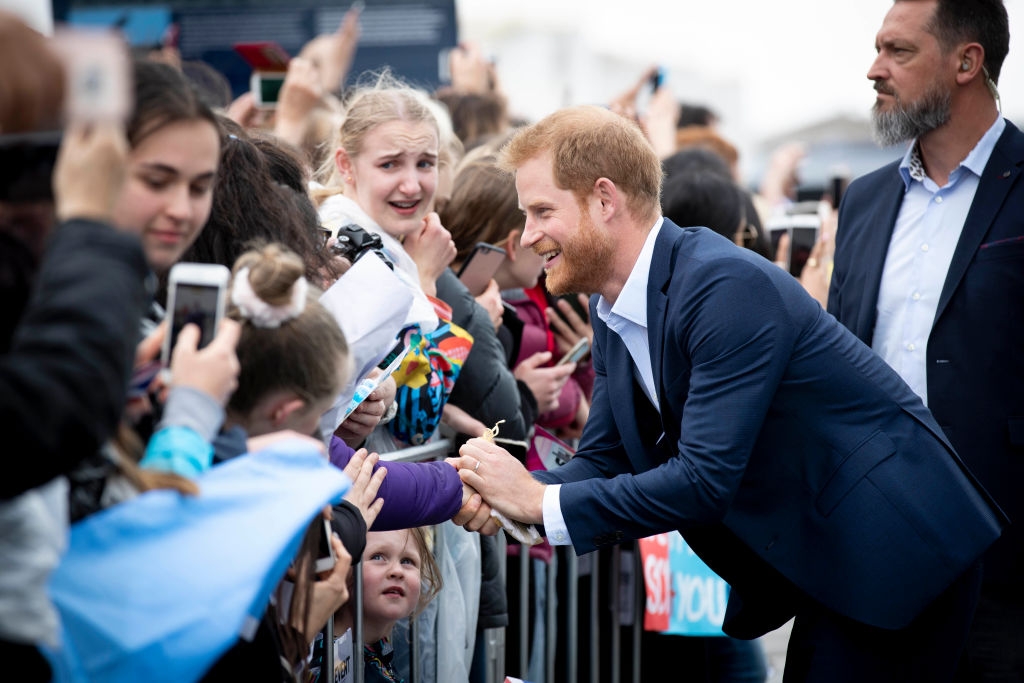Meghan Markle and Prince Harry arrived in New Zealand, and Prince Harry had some special words for a six year old boy who lost his mother. Prince Harry’s thoughtful approach with the boy is an excellent example of the kind of behavior experts say will help children get through the grief of losing a loved one.
The royal couple took a walking tour of New Zealand’s capital city, Auckland. It was on this walkabout that Prince Harry stopped to say hello to a small face in the crowd: Otia Nante. Te Nante, Otia’s grandmother, spoke about their interaction to News Corp Australia. Her grandson lost his mother, as Prince Harry did at age twelve, and she told that to Prince Harry as he accepted a letter that Otia handed to him.
Prince Harry’s words to Otia, as reported by News Corp Australia, drew on his familiarity with the experience of living through a parent’s death while still very young. “Life will always be alright. You know that? I’ve made it to 34 years old, and life is great,” he said. “I have a beautiful wife and a baby on the way. Your life is going to be sorted. Don’t you worry about that.” He offered comfort, understanding, and confidence that Otia would make it through his grief.
This approach is powerful. “There is a lot of benefit to talking about childhood grief with others who have had a similar experience,” says Katherine Shear, M.D., a professor of psychiatry at Columbia University’s School of Social Work and the Director of Columbia’s Center for Complicated Grief. “Even though it is a truism that everyone grieves in their own way, there are a lot of commonalities in grief that can be shared… Finding others in the same boat can be very comforting.”
This effect may be especially powerful coming from famous role models, explains Julie B. Kaplow, Ph.D., A.B.P.P., director of The Trauma and Grief Center at Texas Children’s Hospital. She brought up successful initiatives like Todd Arky’s Shared Grief Project, which features the stories of notable figures, like basketball player Kyrie Irving, who also lost parents as kids. Prince Harry and his compassionately shared story may have that reassuring effect for Otia (and will, perhaps, for other kids, too).
Hearing someone you admire talking about their grief helps to normalize it, Kaplow explains. Otherwise kids whose peers might not understand their experience, can feel isolated. Grief support programs can also help reassure children that they’re not alone.
Normalization should start with open conversation at home. The role of other surviving family members in helping a child grieve is crucial, Kaplow emphasizes. This is something Prince Harry seems to understand, based on his interaction with Otia. As Te Nante explained to News Corp Australia, Prince Harry had some words for her, too, telling her, “You’re doing a great job, Nan. Nans are so important in our lives.”
“Surviving caregivers play a major role in a child’s grieving process,” Kaplow says. “Allowing for open communication about the death leads to fewer maladaptive symptoms.” It’s also vital to keep talking about the death, even for years afterwards, as the Nantes have. Fifty-seven percent of Millennials and members of Generation Z who lost a parent as a child report that support tapers off after just three months, while their processes of moving on averaged a full six years.
If there’s a grieving child in your life, here are a few tips for how you can continue the conversation with them, as Prince Harry and Te Nante did for Otia.
First, take care of yourself
A common mistake made by surviving parents of a grieving child is focusing completely on their child’s grief and ignoring their own needs, Kaplow says. This loving impulse can ultimately be damaging for the child: “Seeing their parents’ distress can just cause children to feel more distress.” Make sure you are taking care of yourself as well as the child in your life if you, too, are grieving.
Help the child find ways to carry on the legacy of the person they lost
Kaplow notes that many children struggle with “identity or existential grief,” or the feeling that “you can’t go on” without the family member. To aid with healthy processing of this dimension of death, remind your children of the positive legacy of the departed loved one — for example, point out the traits they have in common with that person.
Help the child find new sources of meaning
Kaplow suggests helping children grapple with the circumstantial dimension of grief, or “a preoccupation with how the death occurred,” by helping them to feel a sense of purpose or meaning. For example, Kaplow recalls one child whose parent died in a plane crash deciding to learn to build airplanes so he could figure out how to stop future crashes from occuring. Such a sense of purpose can help a child move forward from focusing on the death to living their life.
Follow us on Facebook for all the latest news on how you can keep Thriving.
More from Thrive Global:
8 Things You Should Do After 8 P.M. If You Want to Be Happy and Successful


